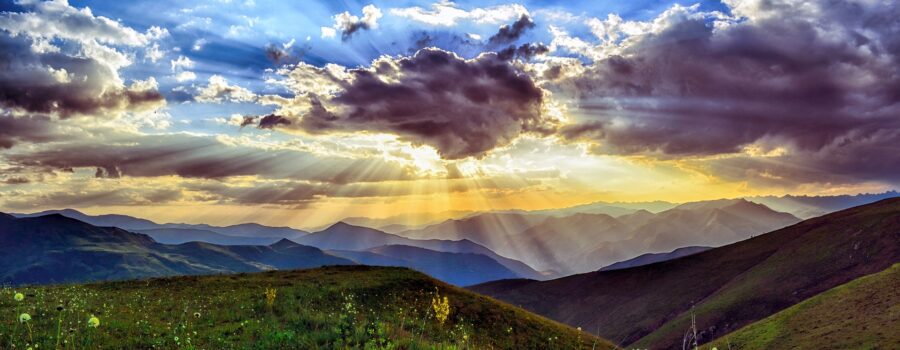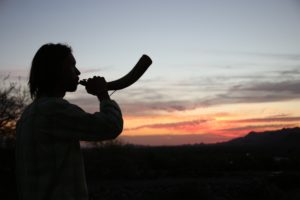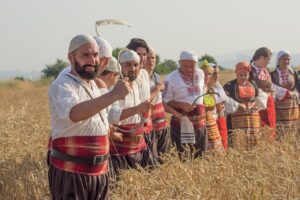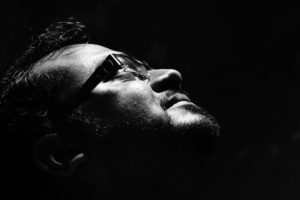In this brief series we will consider the deep contrast between a life of divine dependence and a life of self-sufficiency. I have chosen the story of Abraham and Lot to achieve this end, for it exemplifies beautifully the disparity between the two lifestyles.
Our opening text
“Then Abram went up from Egypt, he and his wife and all that he had, and Lot with him, to the South. 2 Abram was very rich in livestock, in silver, and in gold.3 And he went on his journey from the South as far as Bethel, to the place where his tent had been at the beginning, between Bethel and Ai, 4 to the place of the altar which he had made there at first. And there Abram called on the name of the Lord. 5 Lot also, who went with Abram, had flocks and herds and tents. 6 Now the land was not able to support them, that they might dwell together, for their possessions were so great that they could not dwell together. 7 And there was strife between the herdsmen of Abram’s livestock and the herdsmen of Lot’s livestock. The Canaanites and the Perizzites then dwelt in the land. 8So Abram said to Lot, “Please let there be no strife between you and me, and between my herdsmen and your herdsmen; for we are brethren. 9 Is not the whole land before you? Please separate from me. If you take the left, then I will go to the right; or, if you go to the right, then I will go to the left.” 10 And Lot lifted his eyes and saw all the plain of Jordan, that it was well watered everywhere (before the Lord destroyed Sodom and Gomorrah) like the garden of the Lord, like the land of Egypt as you go toward Zoar. 11 Then Lot chose for himself all the plain of Jordan, and Lot journeyed east. And they separated from each other. 12 Abram dwelt in the land of Canaan, and Lot dwelt in the cities of the plain and pitched his tent even as far as Sodom.” (Genesis 13:1–12)
Abraham dwelt in the land of Canaan
In this present post I will focus on the place Abraham dwelled, namely, the land of Canaan, a land contrasting exceedingly with the plains of Jordan as we will see in subsequent posts.
In the Book of Deuteronomy we have a brief description of that land. Pay attention to the way God describes it (here God is speaking to Moses):
For the land which you go to possess is not like the land of Egypt from which you have come, where you sowed your seed and watered it by foot, as a vegetable garden; 11 but the land which you cross over to possess is a land of hills and valleys, which drinks water from the rain of heaven, 12 a land for which the Lord your God cares; the eyes of the Lord your God are always on it, from the beginning of the year to the very end of the year. (Deut. 11:10–12)
Here God is contrasting the land of Canaan with the land of Egypt, pointing out their main difference, namely, that the land of Egypt was a land of self-sufficiency and the land of Canaan a land of divine dependence.
The Land of Egypt
In the land of Egypt there was the Nile River, a river that rarely went dry due to the steady tropical rains in Ethiopia. Therefore people could divert the water of the Nile River to irrigate their fields through an elaborated web of canals. This was done by using one foot to close or open miniature doors that impeded or released the flow of water in a specific canal. So when the fields were getting dry people could irrigate them anytime they wanted. Consequently, Egypt was a land of self-sufficiency. With rain or without rain its inhabitants could manage relatively well. Granted there were some exceptions to the rule, as the drought that occurred in the days of Joseph, Egypt was most of the time a stable place promoting self-sufficiency and relative ease. (There are other interpretations for “watered it by foot” but they all lead us to the same conclusion.)
The land of Canaan
In absolute contrast the land of Canaan depended of the rain coming from heaven. It had no natural reservoirs. Therefore, as far as irrigation was concerned, there was little Abraham could do, which means, the divine providence was fundamental for his survival. Happily, God had told him what he needed to do to prosper in that land:
And it shall be that if you earnestly obey My commandments which I command you today, to love the Lord your God and serve Him with all your heart and with all your soul, 14 then I will give you the rain for your land in its season, the early rain and the latter rain, that you may gather in your grain, your new wine, and your oil.15 And I will send grass in your fields for your livestock, that you may eat and be filled.’ 16 “Take heed to yourselves, lest your heart be deceived, and you turn aside and serve other gods and worship them, 17 lest the Lord’s anger be aroused against you, and He shut up the heavens so that there be no rain, and the land yield no produce, and you perish quickly from the good land which the Lord is giving you.” (Deut. 11:13-17)
Here God is calling the Land of Canaan a good land, and it was so because the Lord cared for it; His eyes were always on it, from the beginning of the year to the very end of the year (Deut. 11:12). But as we have just read, the prosperity of the land depended on the degree Abraham was going to obey God. Was he to rebel? He would have doomed himself and suffered penury. But in the plains of Jordan—which was, according to God, similar to the land of Egypt—it was not so. A person could live an amoral life and prosper, at least materially.
The challenge for Abraham
We must also take note that Abraham was not born in the midst of hills and valleys. He was from the plains of the Euphrates, from Ur of the Chaldeans, a land of self-dependence as the land of Egypt was. There the fields were irrigated by means of the Euphrates River. Hence, there was little risk of a famine. Like in the plains of Egypt the moral life of its inhabitants didn’t bear on their final harvests. They were, so to speak, masters of their own prosperity. That’s the kind of life Abraham experienced during the first 70 years of his life. But God took him out of his comfort zone and eventually brought him to the land of Canaan. There Abraham had to learn a different lifestyle, a life of faith in the great Provider in Whom he depended. This he did and was therefore able to taste the best of the very best, viz., the milk and honey of what was to become the Promised Land.
The person who depends on God will always inherit the highest possible good. There is no doubt about it. But he must dare and get his priorities right, and mostly, keep his heart clean.
On my next post we will have a look to the plains of Jordan where Lot went to dwell, a land of self-dependence and tragedies.
If you think this post can help somebody you can share it with one of the options presented bellow.













